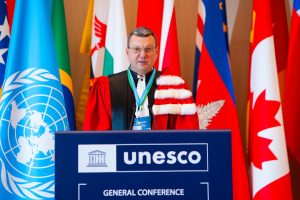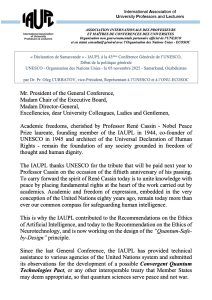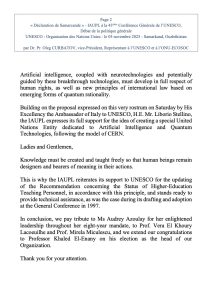 (site de l’UNESCO de la 43ème Conférence Générale ici)
(site de l’UNESCO de la 43ème Conférence Générale ici)
Excellencies, Distinguished University Colleagues, Ladies and Gentlemen,
International Association of University Professors and Lecturers (IAUPL) expresses its deepest gratitude to the Republic of Uzbekistan for its warm welcome and for hosting this General Conference.
We pay tribute to Ms. Audrey Azoulay for her enlightened leadership throughout her eight years in office, and we extend our congratulations to Professor Khaled El-Enany on his election as the new head of our Organization.
Ladies and Gentlemen,
Academic freedoms, so dear to Professor René Cassin, Nobel Peace Prize laureate, founding member of the IAUPL in 1944, co-founder of UNESCO in 1945, and architect of the Universal Declaration of Human Rights – remain the cornerstone of every society founded on freedom of thought and human dignity.
The IAUPL thanks UNESCO for the tribute that will be paid next year to Professor Cassin on the fiftieth anniversary of his passing.
To continue the spirit of René Cassin today means to unite knowledge with peace, by placing fundamental rights at the very heart of the mission of academics.
Academic and expressive freedom, enshrined in the very conception of the United Nations eighty years ago, remains today more than ever our common compass for safeguarding human intelligence.
This is why the IAUPL has contributed to the Recommendations on the Ethics of Artificial Intelligence, and now on the Ethics of Neurotechnologies, and is currently working on the development of the “Quantum-Safe-by-Design” principle.
Since the last General Conference, the IAUPL has presented its observations to the United Nations system agencies regarding the design of a possible Convergent Technological Pact for Quantum Technologies, or any other interoperable treaty that Member States may deem appropriate, so that quantum sciences may serve peace.
Artificial intelligence, coupled with neurotechnologies and potentially guided by these disruptive technologies, must evolve in full respect of human rights and in accordance with emerging principles of international law based on new forms of « quantum rationality ».
Following the proposal made last Saturday by His Excellency Mr. Liborio Stellino, Ambassador of Italy to UNESCO, the IAUPL expresses its full support for the idea of creating a special United Nations entity dedicated to Artificial Intelligence and Quantum Technologies, modeled on CERN.
Ladies and Gentlemen,
Knowledge must be created and taught freely so that the human being may remain both the designer and the bearer of meaning in their actions.
For this reason, the IAUPL reiterates its support to UNESCO for the revision of the Recommendation concerning the Status of Higher-Education Teaching Personnel, in accordance with this principle, and stands ready to provide technical assistance, as it did during its drafting and adoption at the 1997 General Conference.
Thank you for your attention.
(FR: texte original):
Excellences, chers Collègues universitaires, Mesdames et Messieurs,
L’Association Internationale des Professeurs et Maîtres de Conférences des Universités (IAUPL) exprime sa profonde gratitude à la République d’Ouzbékistan pour son accueil chaleureux et pour l’organisation de cette Conférence Générale.
Nous rendons hommage à Madame Audrey Azoulay pour son leadership éclairé tout au long de ses huit années de mandat, et adressons nos félicitations au Professeur Khaled El-Enany pour son élection à la tête de notre Organisation.
Mesdames, Messieurs,
Les libertés académiques, chères au Professeur René Cassin, Prix Nobel de la Paix – membre fondateur de l’IAUPL en 1944, co-fondateur de l’UNESCO en 1945 et artisan de la Déclaration universelle des Droits de l’Homme – demeurent le socle de toute société fondée sur la liberté de pensée et la dignité humaine.
L’IAUPL remercie l’UNESCO pour l’hommage qui sera rendu au Professeur Cassin, l’année prochaine, à l’occasion du cinquantième anniversaire de sa disparition.
Prolonger l’esprit de René Cassin aujourd’hui, c’est unir le savoir à la paix, en plaçant les droits fondamentaux au cœur des actions des universitaires.
La liberté académique et d’expression, inscrite dans la conception même des Nations Unies il y a quatre-vingts ans, demeure aujourd’hui plus que jamais notre boussole commune pour la sauvegarde de l’intelligence humaine.
C’est pourquoi l’IAUPL a contribué aux Recommandations sur l’Éthique de l’Intelligence Artificielle, aujourd’hui, sur l’Éthique des Neurotechnologies, et œuvre désormais à la conception du principe “Quantum-Safe-by-Design”.
Depuis la dernière Conférence Générale, l’IAUPL a porté ses observations auprès des agences du système des Nations Unies pour la conception d’un éventuel Pacte convergent des technologies quantiques, ou de tout autre Traité interopérable que les États membres jugeront approprié, pour que les sciences quantiques servent la paix.
L’intelligence artificielle, couplée aux neurotechnologies et potentiellement guidée par ces technologies de rupture, doit se développer dans le plein respect des droits de l’homme, ainsi que de nouveaux principes de droit international fondés sur les formes émergentes de « rationalité quantique ».
Dans le prolongement de la proposition exprimée samedi par Son Excellence l’Ambassadeur d’Italie auprès de l’UNESCO, M. Liborio Stellino, l’IAUPL exprime son plein soutien à l’idée de créer une Entité spéciale des Nations Unies dédiée à l’Intelligence Artificielle et aux Technologies Quantiques, sur le modèle du CERN.
Mesdames, Messieurs,
Les connaissances doivent être créées et enseignées librement, afin de rendre l’humain concepteur et porteur de sens dans ses actions.
C’est pourquoi l’IAUPL réitère son soutien à l’UNESCO pour l’actualisation de la Recommandation concernant la condition du personnel enseignant de l’enseignement supérieur, conformément à ce principe, et se tient prête à apporter une assistance technique, comme ce fut le cas lors de sa conception et de son adoption à la Conférence Générale en 1997.
Je vous remercie de votre attention.
Liste complète des Discours (site officiel de l’UNESCO) sont ici


Commentaires récents